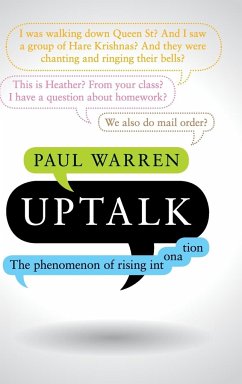'Uptalk' is commonly used to refer to rising intonation at the end of declarative sentences, or (to put it more simply) the tendency for people to make statements that sound like questions, a phenomenon that has received wide exposure and commentary in the media. How and where did it originate? Who are the most frequent 'uptalkers'? How much does it vary according to the speaker's age, gender and regional dialect? Is it found in other languages as well as English? These and other questions are the subject of this fascinating book. The first comprehensive analysis of 'uptalk', it examines its historical origins, geographical spread and social influences. Paul Warren also looks at the media's coverage of the phenomenon, including the tension between the public's perception and the views of experts. Uptalk will be welcomed by those working in linguistics, as well as anyone interested in the way we talk today.
Hinweis: Dieser Artikel kann nur an eine deutsche Lieferadresse ausgeliefert werden.
Hinweis: Dieser Artikel kann nur an eine deutsche Lieferadresse ausgeliefert werden.








